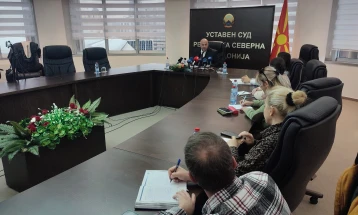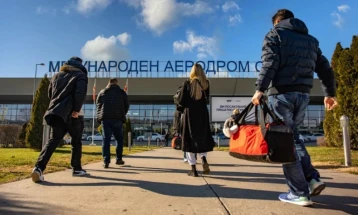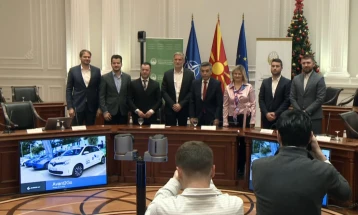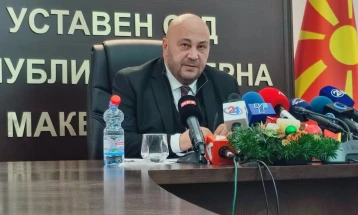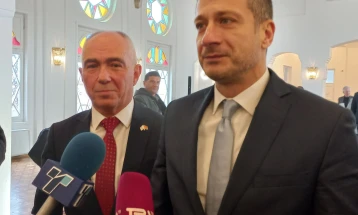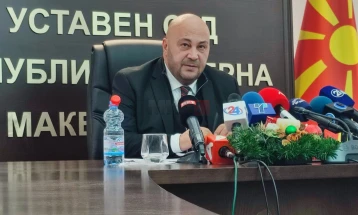UN Women's Gumbonzvanda: Implement gender equality laws, invest in children's future, peace, security
- The country has made significant progress toward gender equality by adopting laws but more needs to be done about implementing those laws and showing in practice what gender equality means for rural women, young women, and women in the workforce, according to UN Assistant Secretary-General and Deputy Executive Director for Normative Support, United Nations System Coordination and Programme Results at the United Nations Entity for Gender Equality and the Empowerment of Women (UN Women) Nyaradzayi Gumbonzvanda in an interview with MIA.
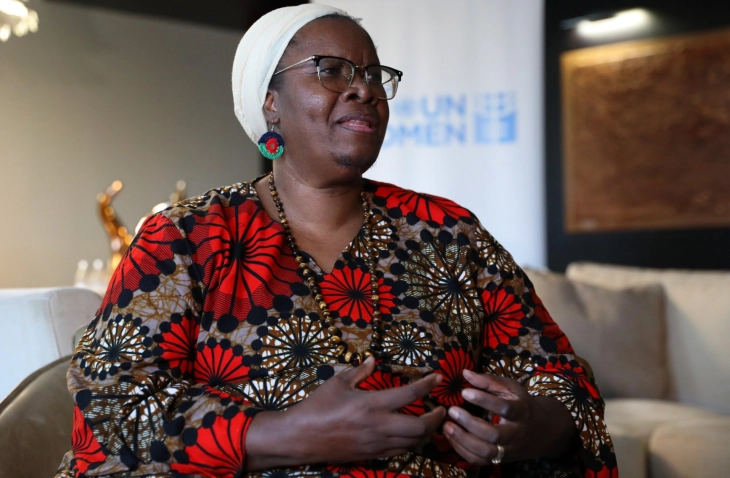
Skopje, 20 October 2024 (MIA) -- The country has made significant progress toward gender equality by adopting laws but more needs to be done about implementing those laws and showing in practice what gender equality means for rural women, young women, and women in the workforce, according to UN Assistant Secretary-General and Deputy Executive Director for Normative Support, United Nations System Coordination and Programme Results at the United Nations Entity for Gender Equality and the Empowerment of Women (UN Women) Nyaradzayi Gumbonzvanda in an interview with MIA.
During her first visit to the country, aimed at strengthening UN Women ties with the government, civil society, donors and the UN system in North Macedonia, Gumbonzvanda met with government officials and NGO representatives to discuss the country's progress on gender equality issues.
Thanking the nation on its hospitality, Gumbonzvanda said she appreciated visiting a country that had a woman as head of state.
"It is special to be in a country where a woman is President. We have very few women as Presidents in the world. I just came out of the UN General Assembly and there were only ten women who spoke and who were there as heads of state out of a hundred. What I also learned about gender equality, there is significant progress in the country. There are laws that exist. At the same time, there is more to be done around the implementation of those laws and also perspectives around what does gender equality mean for the rural women, young women, professionals," she said.
To learn more about gender equality in the country, the UN Women deputy executive director also met with representatives of the Ministry of Social Policy, Demography and Youth and of the Ministry of Agriculture, Forestry and Water Economy. She also visited the State Statistical Office and the resource center where gender statistics, she said, was being used to inform policy, to build capacity in the institutions, and to support resource allocation with gender responsive budgeting.

Education, economic empowerment, and preventing violence against women and girls are some of the critical issues that the country's institutions and civic organizations needed to focus on, she said.
"In the future, there are four issues I would advise you. You know the role of the UN is to support member states, to work with communities and, for us in our mandate, to advance gender equality, the empowerment and rights for women. What I have heard and what is critical to focus on is issues of violence against women and girls so they are safe and secure in their private lives, in addition to their public lives, in that they can have access to survivor support and protection and safe spaces. This was one bundle of issues that was very clear," Gumbonzvanda said.
Also, according to her, the country needs to focus on the economic empowerment of women.
"On the economy, their jobs, income, wellbeing, salaries. So that women farmers can send their honey or their vegetables to the market they can get a good income. But for that to happen, the country should focus on education, especially for the most excluded communities. I heard about the importance of also addressing some of these issues like violence against girls, child marriage among the Roma communities, but education and economic empowerment is critical for women," she said.

Speaking about gender equality in the countries of the Western Balkans, Gumbonzvanda said that UN Women's regional office in Türkiye contributed to the organization's significant presence in the region. She said that during her regional tour she had the chance to speak to women in Bosnia and Herzegovina, Albania, Serbia, and Kosovo.
Women want to live in peace, to have security, and to be included in decision making, she said.
"What I heard from the women, in terms of comparing — and equally from my visit to Bosnia and Herzegovina — are basicaly three issues. It is important to have peace. Women want security, where they are able to simply go about their ordinary lives. So there is that underlying important issue of women, peace and security, and for women to be at the decision-making tables that find solutions to these issues.
"What I also find very common was the importance of women in public office, especially in local authorites. Women want to be in the decision making where they are able to say, 'Do we have local resources providing services where women live their lives?' Whether it is water, collection of refuse, energy resources, schools," Gumbonzvanda said.
The issue of women in decision making had come up often in her conversations across the region, she said.
"We need to continue to support our governments in the region to have the necessary gender equality policies, action plans, which are resourced and funded. To also have sectoral policies and data to monitor the implementation, and to have capacities within those institutions, to step by step ensure we have gender equality and opportunities within our communities," the UN Women deputy executive director said.
Gumbonzvanda highlighted the cultural strength of the region.
"It has strong cultures. It has strong communities. I am an African woman. When we hear of Europe… It is also important to understand the diversities of Europe. So being in the Western Balkans was important for me to also understand what are the issues around Western Europe, the Mediterranean, what does accession to the EU mean, what are the dynamics… So that perspective of understanding the region was also important, she said.
She also gained an important insight into regional migration — people moving for jobs, visiting families and loved ones, or simply enjoying the beauty of this region and this country, she said.

Ahead of the 30th anniversary of the Beijing Declaration and Platform for Action for the empowerment of women, Gumbonzvanda recalled the 12 priorities defined in it and their importance.
"Addressing poverty, the economy, violence against women, womens human rights, the issues of education and health, the environment, climate change but also the role of the media. In Beijing, it was one of the critical roles of concern that we need the media to be part of the solutions. Indeed, having strong institutions," she pointed out.
First, she said, member states needed to uphold their committments to advancing gender equality, to empowering women and girls, and to promoting the human rights of women and girls, around those 12 priorities that were defined.
The second important thing is that our countries have been taking steps to address these issues, she added.
"We must learn from those experiences. This country has experiences I have seen. So the whole area around gender responsive budgeting and gender auditing by the auditor general on performance is a good practice. We must share that," she said, adding she looked forward to a debate on what each country had to offer.
"Thirty years down the line, we say we need women in decision making. And this country will say, 'We have a woman President. We have a woman leading the Ministry of Finance. We have women mayors…' That is progress. Though we need more, but I feel we need to say, progress," Gumbonzvanda said.

Thirty years after the Beijing conference, she said, some of the issues women raised then, were still not resolved. "At Beijing, there was clarity by the women of the world that we want a world with no war. Thirty years down the line, women are still dying, and it is preventable," she said.
At the UN Week in New York, the organization adopted a Pact for the Future. Asked if she was optimistic that the UN can be reformed and actually implement the Pact for the Future. the UN Women deputy executive director said she believed in the nations' commitment.
"I believe in multilateralism. After the tragedy of WWII, the UN was founded. There are many countries. There are many possibilities the UN has delivered in that time. I felt – and just like you, I was tough on the UN and was closely following on the gender equality and other issues – I felt that the fact that issues were on the table negotiated until after midnight or whatever hour it was until the last minute, that is commitment. Because otherwise the negotiations would just have been abandoned and no effort made.
"So the fact there was an effort by the member states to go to the last sentence and reach a measure of consensus was a good step in itself. At the same time, implementation is important. In the reform discussed in the Pact for the Future, which is equally important to us, was the review around the restructuring of the Security Council. It was a good discussion to also have countries like Africa having a seat in the Security Council, the small countries also having a seat… That was good. The discussion around the reform in relation to financial institutions was also important because the issues around debt and governance, global governance of the IFIs, it was important that it was discussed," she said.
Equally emportant for her and for UN Women was the discussion around the reform of ECOSOC-related institutions and the revitalization of the commission on the status of women.
"We were really glad that member states reached that decision. Because the Committee on the Status of Women was one of the very small committees established in 1946 together with the Committee on Human Rights. And, over the 79 years, we have had the Convention On the Elimination of Forms of Discrimination Against Women; we have had the World Conference on Women; the Commission on the Status of Women was established… So this reform to now say let's strengthen again the Commission on the Status of Women was a good decision. The member states were saying, 'We do not want to go below the current standard. We want to strengthen, building on the current standard." You asked whether it will be achieved? Yes, I believe member states, once they make commitments, they should commit to implementation," Gumbonzvanda said.
As deputy executive firector at UN Women, she said, she would continue to bring the voices and experiences of women to inform the decision making of member states, especially the issues to do with peace and security, violence against women, and poverty.
"The world must put resources to human security. I really feel that, professionally and by my responsibility, the world can afford to reduce military expenditure and increase investment in education, in health, in food security, in transport, in energy. Just buying one helicopter less could increase the quality of a couple of schools in many of these countries. The real security of a nation is when its people are safe, educated and able," Gumbonzvanda said.
Her next challenge was to support member states to prioritize national resources in building the future of children. That future requires peace, ending poverty, and building capabilities, she said.
Reporting by Elizabeta Veljanovska Najdeska
Macedonian translation and English language editing by Magdalena Reed
Video and editing by Srgjan Krstikj
Boris Kunovski
Jovan Dimovski
Photos by Darko Popov

